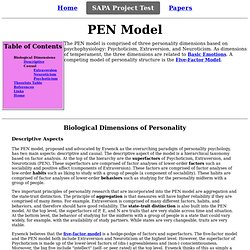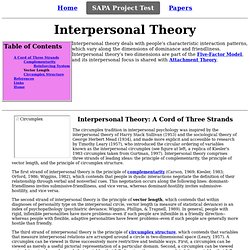

Dealing With Manipulative People. Great Ideas in Personality. Personality Papers This on-line repository provides a publication outlet for 47 theoretical and review papers on the science of personality.

Some papers present original theories that take account of existing research and have testable consequences; other papers describe and evaluate an existing personality research program.
Personality Development - Perspectives On Personality Development, Attachment, Friendship, Self-concept, A Biological Perspective On Personality Development - Individual, Identifying, Differences, and Individuals - JRank Articles. Parenting. Personality Pedagogy - Main - HomePage. Disorders. Great Ideas in Personality. Descriptive Aspects The PEN model, proposed and advocated by Eysenck as the overarching paradigm of personality psychology, has two main aspects: descriptive and causal.

The descriptive aspect of the model is a hierarchical taxonomy based on factor analysis. At the top of the hierarchy are the superfactors of Psychoticism, Extraversion, and Neuroticism (PEN). These superfactors are comprised of factor analyses of lower-order factors such as sociability and positive affect (components of Extraversion). These factors are comprised of factor analyses of low-order habits such as liking to study with a group of people (a component of sociability).
Great Ideas in Personality. Great Ideas in Personality. Acton, G.

S., & Revelle, W. (1998). Interpersonal theory and circumplex structure. Great Ideas in Personality.
Role of Schemas in Personality.